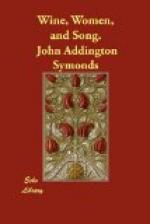O crater parvule!
How my soul yearns for thee!
Make me now merry,
O potus optime,
Claret or hock
or sherry!
Et vos concinite:
Vivant socii!
O vini caritas!
O Bacchi lenitas!
We’ve drained
our purses
Per multa pocula:
Yet hope we for
new mercies,
Nummoram gaudia:
Would that we
had them, ah!
Ubi sunt gaudia? where,
If that they be not there?
There the lads
are singing
Selecta cantica:
There are glasses
ringing
In villae curia;
Oh, would that
we were there!
In Dulci Jubilo yields an example of mixed Latin and German. This is the case too with a comparatively ancient drinking-song quoted by Geiger in his Renaissance und Humanismus, p. 414. It may be mentioned that the word Bursae, for Burschen, occurs in stanza v. This word, to indicate a student, can also be found in Carm. Bur., p. 236, where we are introduced to scholars drinking yellow Rhine wine out of glasses of a pale pink colour—already in the twelfth century!
THE STUDENTS’ WINE-BOUT.
No. 47.
Ho, all ye jovial brotherhood,
Quos sitis vexat
plurima,
I know a host whose wits are
good,
Quod vina spectat
optima.
His wine he blends not with
the juice
E puteo qui sumitur;
Each kind its virtue doth
produce
E botris ut exprimitur.
Host, bring us forth good
wine and strong,
In cella quod
est optimum!
We brethren will our sport
prolong
Ad noctis usque
terminum.
Whoso to snarl or bite is
fain,
Ut canes decet
rabidos,
Outside our circle may remain,
Ad porcos eat
sordidos,
Hurrah! my lads, we’ll
merry make!
Levate sursum
pocula!
God’s blessing on all
wine we take,
In sempiterna
saecula!
Two lyrics of distinguished excellence, which still hold their place in the Commersbuch, cannot claim certain antiquity in their present form. They are not included in the Carmina Burana; yet their style is so characteristic of the Archipoeta, that I believe we may credit him with at least a share in their composition. The first starts with an allusion to the Horatian tempus edax rerum.
TIME’S A-FLYING.
No. 48.
Laurel-crowned Horatius,
True, how true
thy saying!
Swift as wind flies over us
Time, devouring,
slaying.
Where are, oh! those goblets
full
Of wine honey-laden,
Strifes and loves and bountiful
Lips of ruddy
maiden?




